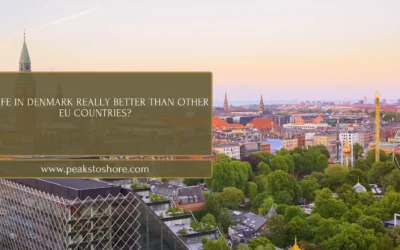Thinking about moving to Portugal? You’re not alone. But is it really the dreamy European escape it’s hyped up to be? Let’s pull back the curtain and take a brutally honest look.
Over the past few years, Portugal has shot up the rankings as one of the top destinations for expats, digital nomads, retirees, and lifestyle seekers. With its golden beaches, laid-back lifestyle, and relatively affordable cost of living, it’s no wonder people are flocking here.
But behind the Instagram-perfect sunsets and cheap wine, is Portugal really all it’s cracked up to be?
Having explored life in Portugal myself and spoken with countless other expats along the way, I’ve gathered the good, the bad, and the not-so-pretty truths about moving here. If you’re contemplating a move, this is your honest, no-filter guide to life in Portugal as an expat.
Why Expats Love Portugal
Let’s start with the obvious: there’s a reason people rave about this country.
1. The Weather is a Dream (Most of the Year)
Portugal enjoys over 300 days of sunshine a year. Cities like Lisbon, Faro, and Setúbal soak up the sun almost all year long, making it perfect for outdoor enthusiasts and vitamin D seekers.
2. Affordable Living (Compared to the Rest of Europe)
Although costs are rising, Portugal is still significantly more affordable than France, Germany, or the UK. Groceries, public transport, and even eating out won’t burn a hole in your wallet (yet).
3. High Quality of Life
Life moves slower in Portugal—in the best way. Locals value time with family, good food, and a relaxed lifestyle. There’s less hustle and more human connection.
4. Safety and Stability
Portugal consistently ranks as one of the safest countries in the world. Violent crime is rare, and even in larger cities, most expats feel comfortable walking alone at night.
5. Stunning Nature and Beaches
From the cliffs of the Algarve to the lush valleys of the Douro, Portugal is as beautiful as they say. And if you’re a beach lover? You’re in heaven.
The Other Side: Is Portugal Overhyped?
1. Salaries are Low (Very Low)
If you’re planning to work locally, prepare for a financial reality check. The average monthly salary in Portugal hovers around €1,200–€1,400—before tax. Even qualified professionals often earn less than their counterparts in northern Europe.
2. Housing Crisis
The demand from foreign buyers and renters has pushed up real estate prices dramatically. In Lisbon and Porto, finding affordable housing is tough. Many locals are being priced out, and expats are now feeling the crunch too.
3. Bureaucracy is Real (And Slow)
Getting a visa, opening a bank account, or registering for healthcare can test your patience. Processes are often outdated, and communication between departments can be painfully inefficient. Expect to queue—and bring your patience.
4. Language Barrier
English is widely spoken in touristy areas, but outside the big cities, Portuguese is essential. If you’re planning to integrate or live long-term, you’ll need to learn the language.
5. Healthcare Access is Uneven
Portugal’s public healthcare system is good—but slow. Wait times can be long, and not all doctors speak English. Many expats opt for private healthcare, which comes at a cost.
Internal Resources from PeakstoShore
- 👉 Best Danish Cuisine: Must-Try Dishes in Copenhagen
- 👉 Best Copenhagen Street Food: Reffen Market Guide
- 👉 Best Copenhagen Co-Working Spaces for Digital Nomads
Navigating Portuguese Bureaucracy
This is one of the areas that catches many expats off guard. Here’s a realistic step-by-step look at what to expect:
Step 1: NIF Number
Before doing almost anything—renting, banking, signing a phone contract—you need a NIF (tax number). You can get this at the local Finanças (tax office), often with a fiscal representative if you’re not yet a resident.
Step 2: Residency (If You’re from the EU)
EU citizens need to register their residence after 90 days. You’ll need proof of income or employment, proof of address, and your ID.
Step 3: Residency (If You’re Non-EU, e.g., via D7 or Digital Nomad Visa)
This is a longer process. You apply in your home country, and once approved, complete residency steps in Portugal. You’ll need a Portuguese address, health insurance, income proof, and sometimes criminal background checks.
Step 4: Social Security and Healthcare Access
Register at your local Segurança Social and health center (Centro de Saúde) to get access to public services. Expect paperwork and wait times.
🔗 Helpful resource: AIMA (Formally SEF Immigration Services)
Social Life and Integration
The expat communities in Lisbon, Porto, and the Algarve are thriving. Events, meetups, coworking spaces, and expat Facebook groups are active and welcoming.
But integration with locals? That’s a different story.
Portuguese people are kind, but their social circles tend to be tight and rooted in long-standing relationships. Integration takes time, effort, and yes—language.
The good news? If you put yourself out there, enroll in a language class, or join local community activities, friendships do form.
Weather: Pros and Cons
🌞 Pros:
- Long, dry summers
- Mild winters in most regions
- Perfect for outdoor living
🌧️ Cons:
- Coastal humidity can be high
- North Portugal gets cold and rainy in winter
- Homes often lack insulation or heating
Don’t expect central heating or double-glazed windows everywhere. Winters inside can be colder than expected.
Hidden Costs of Expat Life
Portugal seems affordable until the hidden costs sneak in:
- Private health insurance: ~€50–€150/month depending on age
- Language classes: If you want to integrate, it’s a must
- Imported goods: Electronics, certain foods, and non-European brands are more expensive
- Car ownership: Buying and maintaining a car is pricey due to high taxes and tolls
Also, keep an eye on currency fluctuations and tax implications if you’re earning from abroad.
Portugal vs. Spain vs. Italy: Which Wins for Expats?
| Feature | Portugal | Spain | Italy |
|---|---|---|---|
| Cost of Living | ⭐ Affordable | Moderate | Moderate–High |
| Weather | ⭐ Sunny & Mild | Hotter in summer | Variable by region |
| Bureaucracy | 😬 Slow | 😬 Also slow | 😬 Very slow |
| Language Barrier | Moderate | Moderate | High without Italian |
| Expat Community | Strong in cities | Very strong in coastal | Mixed |
| Healthcare | Good, uneven access | Excellent public care | Strong but complex |
Portugal is often the easiest “soft landing” for first-time expats—but Spain and Italy offer more cultural depth for some. Your pick depends on your goals and lifestyle.
Is Portugal Worth It?
So—paradise or overhyped?
The truth is, Portugal is both. It’s a country of immense beauty, charm, and potential, but also one that requires patience, flexibility, and a touch of resilience.
If you’re looking for a relaxed, sun-soaked lifestyle and don’t mind navigating slow bureaucracy or learning the language, Portugal might just be your perfect fit.
But if you’re chasing high salaries, fast-paced living, or guaranteed convenience? You may want to rethink it.
What’s Your Verdict?
Have you been to Portugal or are you planning a move? Let us know in the comments! 👇
Is it the dream you imagined—or are the cracks starting to show?






0 Comments